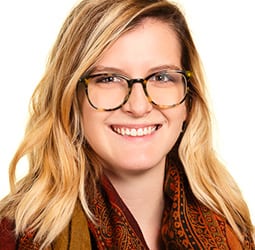Steph Solis knew she wanted to be a journalist since she was little. “I was one of those obnoxious kids who has known since sixth grade,” she laughs. But it was in high school, at the school paper, that she got the sense that journalism was something she could make a career out of.
She was aware of the layoffs and other industry issues but says that being a news writer called to her.
Steph works for the Asbury Park Press (New Jersey), covering immigration as her main beat. Her favorite piece she has written was about a group of Indonesian Christians being targeted by ICE and seeking sanctuary in a church. She was able to imbed with the group for a day and a half and watch their reactions upon learning they’d be allowed to safely leave sanctuary.
“The only way you can actually cover something is by seeing it for yourself, or getting as many first-person accounts as possible,” she says. She takes her responsibility as a journalist seriously, priding herself on telling accurate stories for ‘the first draft of history.’
“I tell the victims and suspects’ perspectives to the best of my ability,” she says. Her favorite part of her job is coming across immigration stories that surprise her. “I hate when people fall into troupes – I try to tell where people are coming from,” she says. “I want to know what made them who they are.”
She hopes to get more investigative projects under her belt and describes her work so far as just scratching the surface.
As a reporter in 2018, Steph has faced more than her fair share of cries of “fake news.”
“My news outlet encourages us to engage with readers and sources on social media – I have sources and readers who comment on things. The most frustrating thing is when, instead of reading the article, people just say, ‘That’s fake news’ or ‘You’re against Trump.’ It’s difficult to have a nuanced conversation when you’re relying on social media to promote stories.”
But that doesn’t mean all criticism of the media is unfounded.
She urges all reporters to do some introspection and learn how to do their jobs better. “Especially in immigration, I can’t tell you how many times you have reporters who won’t understand and they accidentally violate religious or cultural sensitivities or make assumptions. They won’t apologize and that makes it harder for the next reporter.”
Steph advises reporters just starting out to show deference and try to make friends with older reporters with institutional knowledge. “Respecting that institutional knowledge will help make the newsroom stronger and avoid embarrassing errors that friends can help you prevent,” she says.

Contributing writer

